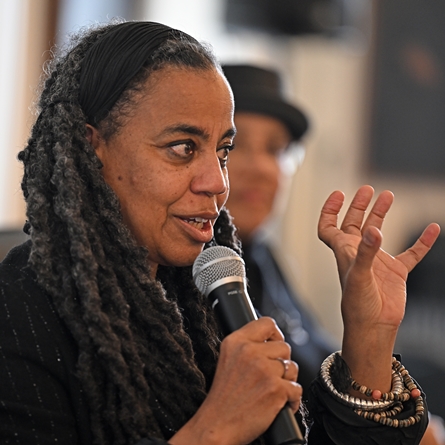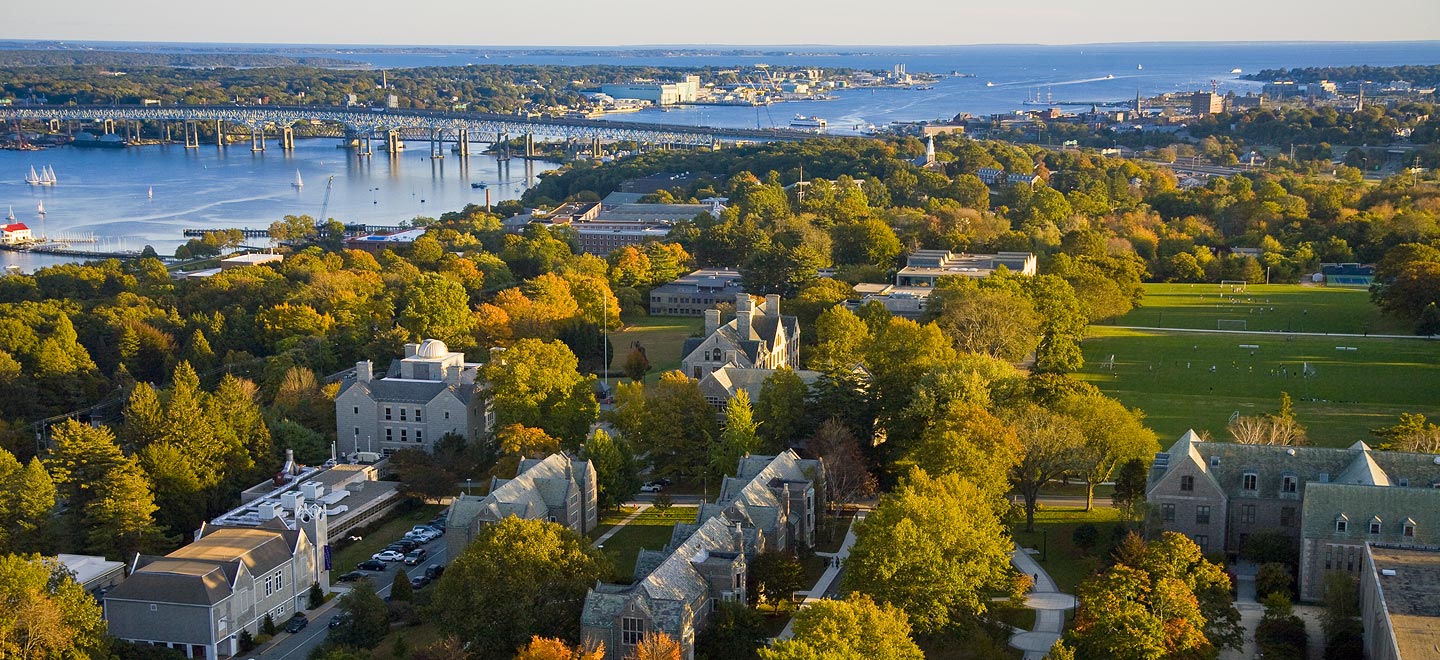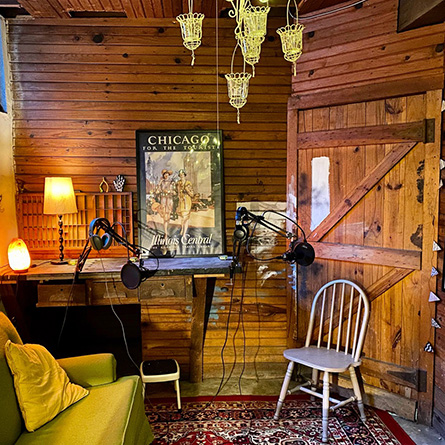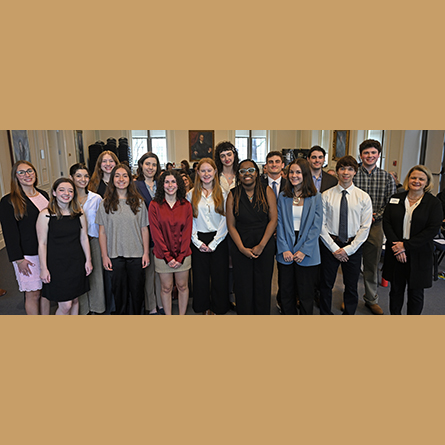
Classes resume remotely
Halfway through Connecticut College’s Spring Break, Assistant Professor of Government Mara Suttmann-Lea tweeted a picture of podcast equipment set up in her cozy home office space.
“Coming soon from my cabin in the woods as a limited-edition release exclusively (for now) for the Spring 2020 Gov 111 class @ConnCollege: ‘Herein Granted: A Podcast About American Politics,’” she captioned the pic, adding #SocialDistancing.
Suttmann-Lea was preparing for March 25, when classes officially resumed. Remotely. Earlier this month, President Katherine Bergeron announced that Conn would transition all classes to distance learning to preserve the health and safety of the entire community and prevent the spread of COVID-19.
“Connecticut College is a community of character and a community of care. When faced with extraordinary circumstances we think about each other, coming together to work out solutions that are in the best interest of our students, faculty, and staff,” Bergeron wrote to the community.
As soon as the announcement was made, Conn’s faculty began reaching out to students, who were already on Spring Break, and finding innovative ways to adapt their in-person courses for remote instruction.
For Suttmann-Lea, that meant recording a podcast timed to lecture slides for her “Introduction to American Politics” course.
“This week’s episodes focus on the powers of the presidency. Next week we will be transitioning to Congress, and from there we’ll cover other components of the American political system like the bureaucracy, the courts, political parties, public opinion and elections,” she said, adding that she is doing her best to keep things consistent while also being attuned to the different positions her students are in.
“It’s important to make learning as equitable as possible. Some students may not have consistent access to the internet, or a computer with a microphone or a video camera. I think being open and flexible is really key, both for students and myself.”
Michael Reder, director of the College’s Joy Shechtman Mankoff Center for Teaching & Learning (CTL), agrees. Reder and his colleagues in the CTL and in Conn’s Information Technology group created a tip sheet, “11 Teaching-Focused Things to Consider when Moving Your Course Online,” that has been shared hundreds of times and prompted inquiries from faculty all over the country and as far away as Germany.
As colleges and universities around the world prepared to make the transition to online teaching and learning, much of the initial information being shared on professional listservs, in media covering higher education and on college campuses was focused on technology rather than the important teaching aspects of remote learning.
“We wanted to create a document that emphasized recreating the connection between and among the members of the class, focusing on the affective and emotional well-being of the students,” Reder said.
“Our students are going to learn better, and our faculty are going to teach better, when they feel connected and emotionally safe. It’s important to establish that online before you even start the other parts of the course,” he told The Chronicle of Higher Education.
Lexi Pope ’21 says her professors have done a great job staying connected and acknowledging students’ unique circumstances.
“They made it clear that they are truly here to support and help us,” she said.
A psychology major, human development minor and scholar in the Bodies/Embodiment Pathway, Pope says she feels ready to embark on the online learning experience she never expected. She’s created a study space in her home in Massachusetts and is keeping in touch with her classmates and friends.
“I think it speaks highly of Conn that I still feel a sense of community even at a time where we are so far apart,” she said. “We have been using social media and technology to our advantage. The Conn community has been very active, and things like workout classes, motivation and advice are floating around. Students are also all reaching out to each other and coming up with new ways to stay connected, which I find admirable.”
Marc Zimmer, the Jean C. Tempel '65 Professor of Chemistry, has been in touch with his students throughout the break. He quickly realized he’d have to adopt different approaches for his different classes.
“My ‘Introduction to Chemistry’ class has students in Vietnam, Bangladesh, Africa, Hawaii—all over the world,” he said. “It would be impossible to teach all of them at the same time.”
For that class, Zimmer is recording lectures, providing materials to download and breaking the class into smaller discussion groups that take into account their various time zones. His smaller courses will continue to meet virtually, usually at their regularly scheduled times. But those courses are changing, too.
Zimmer scrapped plans to teach a section of a Toor Cummings Center for International Studies and the Liberal Arts (CISLA) course, “Good Science, Bad Science, New Science, Old Science.” Instead, he’ll teach “COVID-19: Diseases Without Borders.” The course section will cover the impact of globalization, high-density housing and food supplies, as well as the differences in the international responses to different epidemics.
Even before Spring Break, Zimmer’s chemistry students were learning how masks work to protect healthcare workers.
“I just sent them an article about how the Coronavirus test works, and reminded them of all the chemistry that we learned in class that the test uses,” he said. “It’s a great opportunity to show them, ‘This is why you are learning chemistry. It’s not all theoretical, it has very important practical uses.’”
Other faculty are also working current events into their syllabi. Julia Flagg, the Lenore Tingle Howard ’42 Assistant Professor of Sociology and Environmental Studies, has asked students in her 400-level seminar, “Disasters,” to keep a journal about their experiences with COVID-19.
“I've invited them to record what they're experiencing right now, what the last two weeks have been like, what emotions they're experiencing," she said. “I also asked them to consider how COVID-19 is similar to and/or different from the other disasters we’ve studied.
“We've discussed a lot of things—social vulnerability, how disasters exacerbate pre-existing inequalities along the lines of race, ethnicity, class, gender and nationality, etc.—that we are seeing play out in the news right now.”
Flagg adds that for all of her courses, she’s using slightly different approaches that she expects to adapt over time.
“I'll reflect on how the class is going, seek feedback from the students and make changes,” she said.
Some faculty in fields that rely heavily on in-person experiences, including the arts, are having to get a little extra creative. But they are up to the challenge, says Professor of Dance David Dorfman.
“I am so amazed at all of my colleagues at the College. Where there’s a will, there’s a way,” he said. “Many faculty and worldwide dance artists are making dances, podcasts and master classes available online. There’s a lot we can work from.”
For things that can’t be done online, like the annual Senior Thesis Concert, Dorfman and his colleagues are looking at every possible option. The show was to feature dances choreographed by each of 10 senior dance majors, as well as a dance choreographed by Dorfman, and dances by guest artists Shakia Johnson, and Rashaun Mitchell and Silas Riener. Additional performances of senior honors theses by dance majors and minors were also planned. They were all previewed before the break, and Dorfman said critiques will continue with distance learning. Options being considered for the final concert include a performance in the summer or an alumni concert sometime this fall.
For other courses, including “Dancers Act, Actors Dance,” Dorfman has worked with students to identify spaces in their homes where they can dance.
“Sometimes it’s a hallway, or a rec room, or part of a living room. Sometimes it’s outside,” Dorfman said. “We are going to make it happen.”


